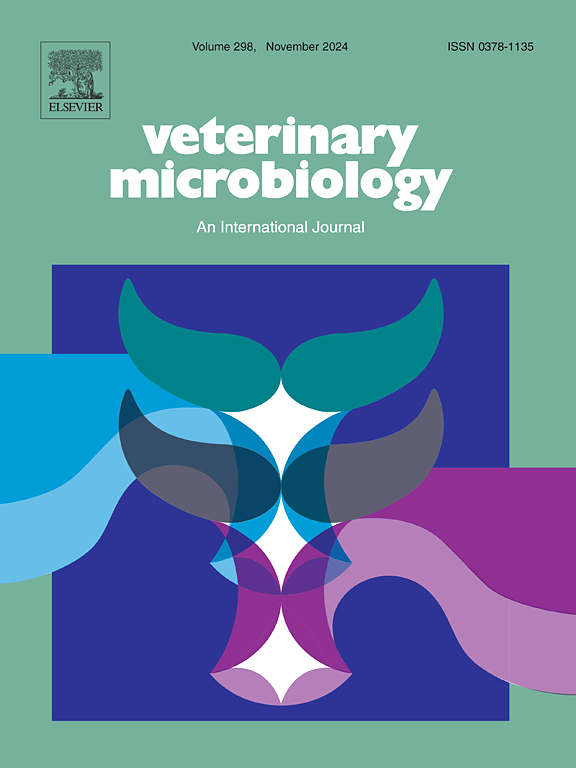一种三价肠道冠状病毒灭活疫苗可有效预防PEDV、TGEV和PDCoV
IF 2.4
2区 农林科学
Q3 MICROBIOLOGY
引用次数: 0
摘要
猪流行性腹泻病毒(PEDV)、传染性胃肠炎病毒(TGEV)和猪三角冠状病毒(PDCoV)是导致仔猪严重腹泻和死亡的三种主要冠状病毒。临床病例中经常出现这些病原体的合并感染,使临床症状加重,给养猪业造成重大经济损失。目前,没有一种市售疫苗对所有三种病毒都具有广谱保护功效。本研究研制了一种以PEDV、TGEV和PDCoV为靶点的三价灭活疫苗,并对其免疫保护作用进行了评价。中和抗体试验表明,在增强免疫后第7天,所有接种仔猪的滴度均达到1:64或更高。分别用PEDV、TGEV和PDCoV攻毒猪。攻毒对照组的腹泻更严重、时间更长,病毒脱落水平更高,肠绒毛大量萎缩,回肠病毒抗原阳性滤出,而三价灭活疫苗组的腹泻症状明显较轻,病毒脱落水平较低,肠绒毛损伤轻微,病毒抗原滤出最少。这些结果表明,PEDV-TGEV-PDCoV三价灭活疫苗可有效保护猪免受这三种肠道冠状病毒的感染。本文章由计算机程序翻译,如有差异,请以英文原文为准。
A trivalent enteric coronaviruses inactivated vaccine provides effective protection against PEDV, TGEV, and PDCoV
Porcine epidemic diarrhea virus (PEDV), transmissible gastroenteritis virus (TGEV), and porcine deltacoronavirus (PDCoV) are three major coronaviruses responsible for severe diarrhea and mortality in piglets. Co-infections of these pathogens are frequently present in clinical cases, which aggravate the clinical symptoms and cause substantial economic losses in the swine industry. Currently, no commercially available vaccine has broad-spectrum protective efficacy against all three viruses. In this study, we developed a trivalent inactivated vaccine targeting PEDV, TGEV, and PDCoV, to evaluate its immune protection, suckling piglets were intramuscular immunized with trivalent inactivated vaccine using prime-boost immunization. Neutralizing antibody assay showed that all vaccinated piglets achieved titers of 1:64 or higher at 7 day-post-boost immunization. The pigs were orally challenged with PEDV, TGEV, and PDCoV respectively. More severe and prolonged diarrhea, higher levels of viral shedding, substantial intestinal villus atrophy, and positive straining of viral antigens in ileum were detected in challenge control groups, while the trivalent inactivated vaccine groups exhibited significantly milder diarrhea symptom, lower levels of viral shedding, minor intestinal villi damage and minimal straining of viral antigens. These results demonstrated that the PEDV-TGEV-PDCoV trivalent inactivated vaccine provide effective protection in pigs against all three enteric coronaviruses.
求助全文
通过发布文献求助,成功后即可免费获取论文全文。
去求助
来源期刊

Veterinary microbiology
农林科学-兽医学
CiteScore
5.90
自引率
6.10%
发文量
221
审稿时长
52 days
期刊介绍:
Veterinary Microbiology is concerned with microbial (bacterial, fungal, viral) diseases of domesticated vertebrate animals (livestock, companion animals, fur-bearing animals, game, poultry, fish) that supply food, other useful products or companionship. In addition, Microbial diseases of wild animals living in captivity, or as members of the feral fauna will also be considered if the infections are of interest because of their interrelation with humans (zoonoses) and/or domestic animals. Studies of antimicrobial resistance are also included, provided that the results represent a substantial advance in knowledge. Authors are strongly encouraged to read - prior to submission - the Editorials (''Scope or cope'' and ''Scope or cope II'') published previously in the journal. The Editors reserve the right to suggest submission to another journal for those papers which they feel would be more appropriate for consideration by that journal.
Original research papers of high quality and novelty on aspects of control, host response, molecular biology, pathogenesis, prevention, and treatment of microbial diseases of animals are published. Papers dealing primarily with immunology, epidemiology, molecular biology and antiviral or microbial agents will only be considered if they demonstrate a clear impact on a disease. Papers focusing solely on diagnostic techniques (such as another PCR protocol or ELISA) will not be published - focus should be on a microorganism and not on a particular technique. Papers only reporting microbial sequences, transcriptomics data, or proteomics data will not be considered unless the results represent a substantial advance in knowledge.
Drug trial papers will be considered if they have general application or significance. Papers on the identification of microorganisms will also be considered, but detailed taxonomic studies do not fall within the scope of the journal. Case reports will not be published, unless they have general application or contain novel aspects. Papers of geographically limited interest, which repeat what had been established elsewhere will not be considered. The readership of the journal is global.
 求助内容:
求助内容: 应助结果提醒方式:
应助结果提醒方式:


